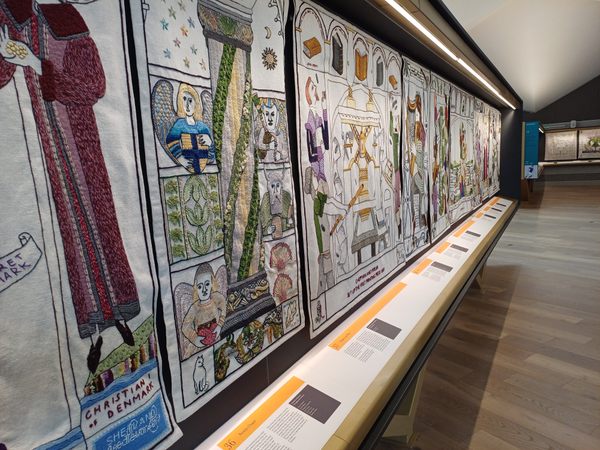The Great Tapestry of Scotland is an art project intended to represent the history and culture of the nation via a stitched tapestry. Inspired by historical precedents like the famous Bayeux Tapestry, artist Andrew Crummy decided to revive the storytelling and documentation medium to tell the story of the town of Prestonpans. When noted author Alexander McCall Smith saw the Prestonpans Tapestry, he recruited Crummy for the project to create a similar work, but for the entirety of Scotland.
Historian Alistair Moffat was then selected to curate the nation’s history and help choose which episodes to represent. Emphasis was placed on adding references to everyday life for commoners and working classes, to complement the expected great events, such as wars. The last, but definitely not least important part of the team, was the stitchers, coordinated by Dorie Wilkie. They were the myriad of textile workers, most of them women, who actually put needles and thread on fabric to illustrate Crummy’s broad designs into the panels. This assembled team decided that, out of 160 panels, one should be dedicated to the iconic building that is the Rosslyn Chapel.
The medieval chapel is known for its impressive architecture and religious role in Scottish Christianity, but perhaps its single greatest level of fame was achieved in modern times thanks to its crucial role in Dan Brown’s 2003 novel The Da Vinci Code. Incorporating historical elements and trivia of real locations into a fictional narrative thriller, the novel (along with its sequels and adaptations) has boosted tourism to many of the locations it features. With references to famously hermetic societies like Opus Dei and the Freemasons, the franchise is also known for inspiring fans to pore obsessively over the narratives looking for real-world equivalents and even more obscure connections. It is perhaps this strong affinity that led to the relevant panel’s theft.
Before the Great Tapestry was housed permanently in this purpose-built location in Galashiels, its panels were toured across Scotland. On September 10, 2015, while it was on tour in Kirkcaldy, panel 36 went missing. It was believed to have been stolen that morning and is still missing as of mid-2024. It took six months for the Great Tapestry team to recover from the sad loss and stitch a replacement, which is currently on display. Panel 36 is the only one so far with such a story, but the other 159 original panels are also well worth admiring as they represent Scotland from a prehistoric, geological timescale, up to the re-establishment of the Scottish Parliament and the early 21st century.

